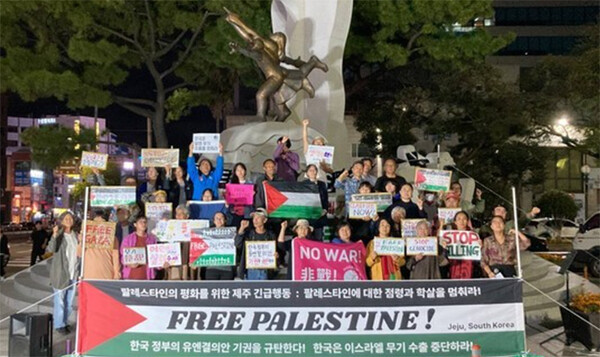Jeju Emergency Action for Peace in Palestine Protest in City Hall

In a passionate demonstration at Jeju Island City Hall this past November 4th, protestors fervently voiced their discontent with the Korean government's abstention during the UN ceasefire vote in Palestine. The rallying cry echoed a threefold demand: first and foremost, an immediate ceasefire rather than a temporary pause, rejecting the notion of momentary respite followed by resumed conflict. Secondly, the demonstrators called for urgent humanitarian aid to alleviate the dire conditions faced by Palestinian civilians—deprivation of water, electricity, communication, food, and access to medical facilities. Lastly, the assembly emphasized the international community's responsibility, including South Korea, to enforce UN resolutions and international agreements on Israel, urging a withdrawal from Gaza, the West Bank, and East Jerusalem. The overarching plea implored South Korea to align with historical justice, distancing itself from support for a nation involved in the colonization and military occupation of Palestinians over the past 75 years.
The protest was organized by the Ganjeong Peace Network in collaboration with the Korean branch of the Boycott, Divestment and Sanctions (BDS) Movement. When The Islander staff approached them and asked them the reason for forming these protests they stated that the passiveness of the Korean government does not reflect the citizens’ plea for international peace: “If North Korea suddenly attacked us, the South Koren government will demand the international community for collaboration and understanding. Precisely because of this, we cannot ignore the cries of help of the Palestinian people.”
While there exists a diplomatic connection, limited in scope with South Korea maintaining a representative office in Ramallah – the de facto administrative capital of Palestine – a noteworthy absence prevails as South Korea, in contrast to numerous Asian nations, has refrained from officially acknowledging the State of Palestine. Advocates contend that South Korea's recognition would fortify safeguards against the encroachment of Israeli settlers. The potential impediments hindering South Korean acknowledgment of the State of Palestine remain undisclosed, prompting inquiries best directed towards South Korean officials for a comprehensive understanding of the current stance. This diplomatic intricacy resonates particularly on Jeju Island, where the protestors raised sentiments of concern, which are heightened due to the geopolitical implications of non-recognition in the face of Israeli actions.

